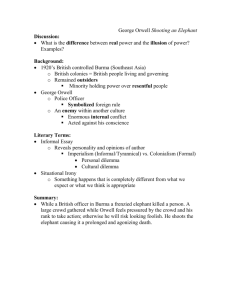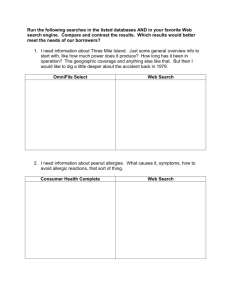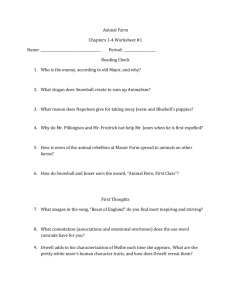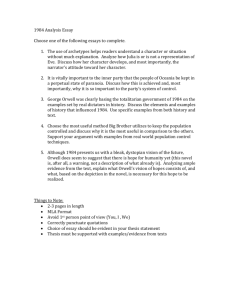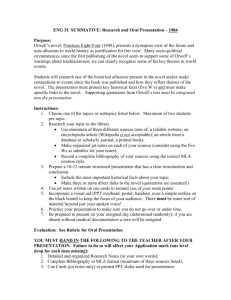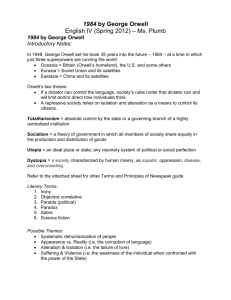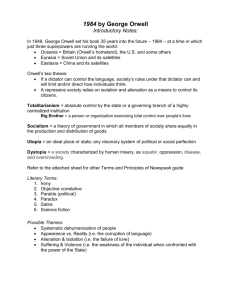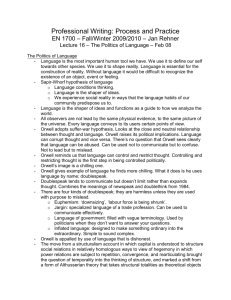Politics and the English Language
advertisement
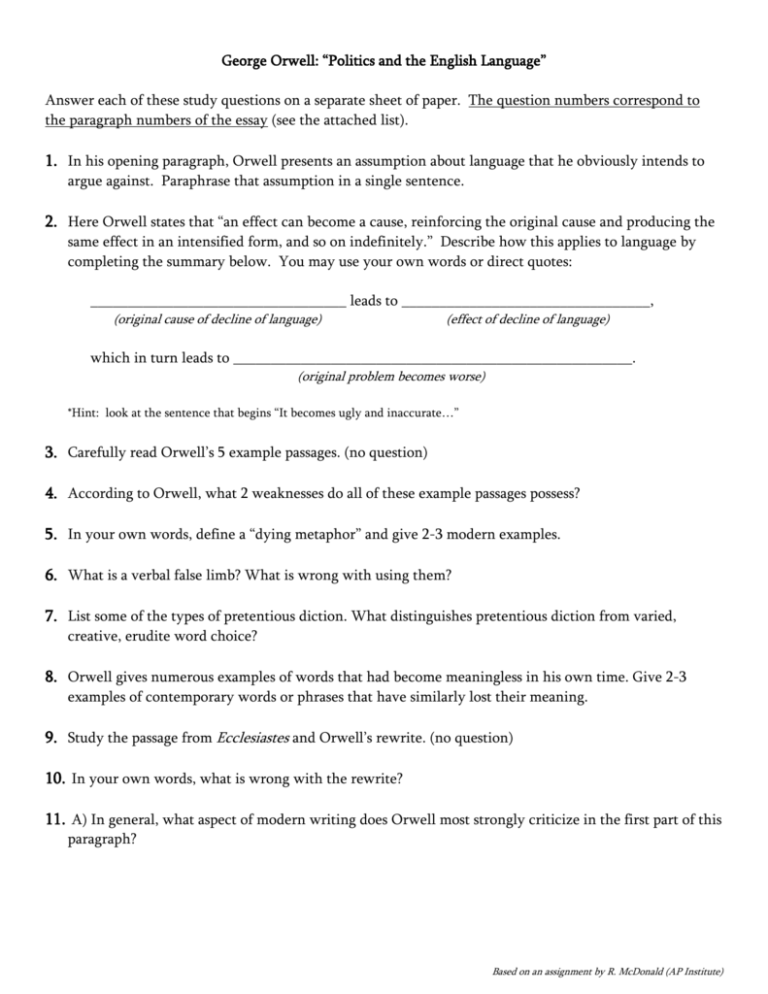
George Orwell: “Politics and the English Language” Answer each of these study questions on a separate sheet of paper. The question numbers correspond to the paragraph numbers of the essay (see the attached list). 1. In his opening paragraph, Orwell presents an assumption about language that he obviously intends to argue against. Paraphrase that assumption in a single sentence. 2. Here Orwell states that “an effect can become a cause, reinforcing the original cause and producing the same effect in an intensified form, and so on indefinitely.” Describe how this applies to language by completing the summary below. You may use your own words or direct quotes: __________________________________ leads to _________________________________, (original cause of decline of language) (effect of decline of language) which in turn leads to _____________________________________________________. (original problem becomes worse) *Hint: look at the sentence that begins “It becomes ugly and inaccurate…” 3. Carefully read Orwell’s 5 example passages. (no question) 4. According to Orwell, what 2 weaknesses do all of these example passages possess? 5. In your own words, define a “dying metaphor” and give 2-3 modern examples. 6. What is a verbal false limb? What is wrong with using them? 7. List some of the types of pretentious diction. What distinguishes pretentious diction from varied, creative, erudite word choice? 8. Orwell gives numerous examples of words that had become meaningless in his own time. Give 2-3 examples of contemporary words or phrases that have similarly lost their meaning. 9. Study the passage from Ecclesiastes and Orwell’s rewrite. (no question) 10. In your own words, what is wrong with the rewrite? 11. A) In general, what aspect of modern writing does Orwell most strongly criticize in the first part of this paragraph? Based on an assignment by R. McDonald (AP Institute) B) Later in the paragraph, he gives 6 questions a careful writer will ask about each sentence he or she writes. Which of these questions would help you most in your own writing? 12. At this point, Orwell moves to the connection between language and politics. “Orthodoxy,” Orwell states, “seems to demand a lifeless, imitative prose.” Why is this so? 13. One of Orwell’s most oft-quoted sentences opens this paragraph. How do political speakers and writers use language to defend what cannot be defended? Give a contemporary example. 14. No question 15. How is insincerity the “great enemy” of clarity? 16. In your own words, explain how language can corrupt thought. 17. and 18. Orwell reasserts his opinion that the decline of language “is probably curable.” A) What is not part of this proposed “defense of the English language” – in other words, what is not the real problem? B) Orwell gives several suggestions to help achieve this clarity of meaning. What are his six rules for good writing? (You may paraphrase.) 19. What, according to Orwell, is the purpose of all political language? What dangers are inherent in this? Do you think Orwell’s assessment is still valid today? Why or why not? Paragraph Numbers 1. “Most people who bother…” (p. 1) 2. “Now, it is clear…” (p. 1) 3. “These five passages…” (p. 1) 4. “Each of these passages has faults of its own…” (p. 2) 5. “Dying metaphors” (p. 2) 6. “Operators or false limbs” (p. 3) 7. “Pretentious diction” (p. 3) 8. “Meaningless words” (p. 4) 9. “Now that I have made this catalogue…” (p. 4) 10. “Here it is in modern English…” (p. 5) 11. “This is a parody…” (p. 5) 12. “In our time it is broadly true…” (p. 6) 13. “In our time, political speech and writing are…” (p. 7) 14. “While freely conceding…” (block quote on p. 7) 15. “The inflated style…” (p. 7) 16. “But if thought corrupts language…” (p. 7) 17. “I said earlier…” (p. 8) 18. “To begin with…” (p. 8) 19. “I have not here been considering…” (p. 9) Based on an assignment by R. McDonald (AP Institute)
